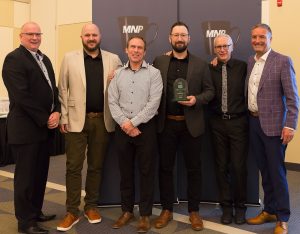Outstanding 2022 Growth Drives Firm To Vancouver Island Business of the Year Award

Vancouver Island Enex team members with a Mobil Race Car
By Mark MacDonald
BRITISH COLUMBIA – When Enex Energy Corp. was named Business of the Year at the January 26 MNP LLP Business Excellence Awards, it didn’t startle the audience, as the current emphasis on renewable energy keeps that sector in the spotlight.
Todd Nicklin, President of the company he and his partners started in 2009 on Vancouver Island was, though. He was pleasantly surprised.
“We’re a fuel and lubricants distribution company and in today’s world that’s not seen as a particularly sexy business,” states Nicklin. “But it’s been fun. In a challenging business environment, in a challenging industry, Enex Energy has continued to thrive thanks to our team. We have managed through pandemics, floods and significant supply challenges.

Enex Energy Corp. President and CEO Todd Nicklin
“Winning this award is fantastic. I am really proud of our team and what they’ve accomplished and how we’ve grown, so this award is not a reflection of anything I’ve done, it’s what they’ve done.”
A 55 per cent increase in business in 2022 over 2021 and continued expansion caught the attention of judges. Enex Energy now operates from 25 locations, including 4 secondary fuel terminals, 11 warehouses and 12 cardlocks and over 75 power units, with 150 employees – up from 45 when the company started.
Enex Energy is comprised of four wholly-owned subsidiaries: Enex Fuels Ltd. and Enex Aviation Services Ltd. on Vancouver Island, Fuelex Energy Ltd. in Vancouver, and Peace Country Petroleum Sales Ltd., which operates in Fort St. John, Dawson Creek and Fort Nelson, as well as in northern Alberta. It is now the largest Esso Fuel and Mobil Lubricants distributor in Western Canada, serving some of Canada’s largest companies, such as CN Rail, CP Rail, Air Canada, WestJet and Petronas.
Acquisitions last year included the purchase of a fuel business in northern Alberta, in March, Bowen Fuels on Bowen Island in June, and a new regional distribution facility for Fuelex in Burnaby. Growing in a changing industry is nothing new for Nicklin, whose family has been in the fuel business for decades, and his father, Ray Nicklin, started Shoreline Petroleums in Port Alberni – the predecessor to Enex – in the 1970’s.
Along with the continuous push for renewable, green energy sources, the oil and gas industry continues to grow and pump much needed revenue into federal and provincial government coffers. Those within the resource sector don’t foresee doom and gloom ahead in the future.

From left, Doug Tyce of title sponsor MNP LLP presented the Vancouver Island Business of the Year Award to Enex Energy Corp., to Sales Manager Justin Looy, Vice President Operations Jamie Fraser, Vice President Business Development James Goodman, Operations Manager Kevin Soproniuk and President and CEO Todd Nicklin
“Certainly there is lots of new technology coming on-line, including nuclear, solar and renewable energy sources,” observes Nicklin. “Yes, other energy is coming on line, but in 35-40 years, this sector won’t be replaced. In no way will there be a complete substitution of the energy solutions our sector provides. I don’t think anybody foresees that.
“As a society, our consumption is growing because our population is growing. Energy defines how good our standard of living is,” he adds. “Third world nations want that energy resource because it improves their standard of living. Literally, in the last month, the global demand for oil rose to the greatest amount it’s ever been. It’s not decreasing the way some people think or hope.”
Nicklin points out that there are environmental costs – as well as increased energy costs – to green energy.
“With Site C dam (in northern BC) there is a huge environmental cost for building that dam,” he states. “We’re running out of dams and the political will to have another one built. So can you imagine putting a nuclear reactor in the middle of BC?”
“We can’t fill the world with wind farms, because those will kill birds. There will be more ideas as well, but at some point, people will say that’s enough, and there will be an equilibrium. When that’s happens, who knows?”
In the meantime, the oil and gas industry has been investing heavily in research and development to make its products more efficient and less environmentally intrusive. Nicklin notes that Imperial Oil is currently investing $1 billion in a renewable diesel plant in Edmonton.
“Fuels themselves have become much more technologically advanced,” he observes. “There has been an introduction of bio-components to fuels, and technology is changing the industry every day.”
“The oil you put in your car today is vastly better than the oil you put in it 10-15 years ago. Even the internal combustion engines we use are more efficient. And they have to be.”
For example, Esso Bio-Protect contains 20 per cent biofuel, but performs comparable to standard diesel. Enex Energy is currently investigating alternate low-carbon fuels, such a hydrogen.”
As a company, Enex Energy’s acquisitions and internal operations have helped prepare it for the future.
“From a business perspective, we’re just trying to satisfy our customers’ needs and wants, fishing, forestry and oil and gas – all those industries are doing quite well, generally speaking,” he notes. “So we kind of ebb and flow as the economy does. Now, it’s nice because we have a really good cross-section across multiple geographies, industries and sectors.
“It’s a nice spot to be in. I am really proud of our team and what they’ve accomplished and how we’ve grown.”


